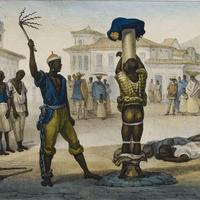3º Poema: A criança, de Os Escravos, de Castro Alves
3rd Poem: The Child, from Os Escravos, by Castro Alves
A criança
The child
Que veux-tu, fleur, beau fruit, ou l'oiseau merveilleux?
What veux-tu, fleur, beau fruit, or l'oiseau merveilleux?
Ami, dit l'enfant grec, dit l'enfant aux yeux bleus,
Ami, dit l'enfant grec, dit l'enfant aux yeux bleus,
Je veux de Ia poudre et des balles.
Je veux de la poudre et des balles.
VICTOR HUGO (Les Orientales)
VICTOR HUGO (Les Orientales)
Que tens criança?
What do you have child?
O areal da estrada
the sand of the road
Luzente a cintilar
Parece a folha ardente de uma espada.
It looks like the burning blade of a sword.
Tine o sol nas savanas.
Tin the sun in the savannas.
Morno é o vento.
Warm is the wind.
À sombra do palmar
in the shade of the palm
O lavrador se inclina sonolento.
The farmer bends over sleepily.
É triste ver uma alvorada em sombras,
It's sad to see a dawn in shadows,
Uma ave sem cantar,
A bird without singing,
O veado estendido nas alfombras.
The deer stretched out on the carpets.
Mocidade, és a aurora da existência,
Youth, you are the dawn of existence,
Quero ver-te brilhar.
I want to see you shine.
Canta, criança, és a ave da inocência.
Sing, child, you are the bird of innocence.
Tu choras porque um ramo de baunilha
You cry because a vanilla sprig
Não pudeste colher,
you could not reap
Ou pela flor gentil da granadilha?
Or by the gentle flower of the grenadilla?
Dou-te, um ninho, uma flor, dou-te uma palma,
I give you a nest, a flower, I give you a palm,
Para em teus lábios ver
For on your lips to see
O riso — a estrela no horizonte da alma.
Laughter — the star on the horizon of the soul.
Não.
Not.
Perdeste tua mãe ao fero açoite
You lost your mother to the fierce lash
Dos seus algozes vis.
Of your vile tormentors.
E vagas tonto a tatear à noite.
And dizzy waves groping at night.
Choras antes de rir... pobre criança!...
You cry before you laugh... poor child!...
Que queres, infeliz?...
What do you want, unfortunate?...
— Amigo, eu quero o ferro da vingança.
“Friend, I want the iron of revenge.

